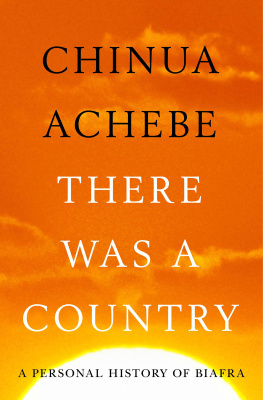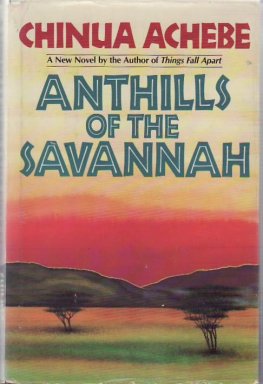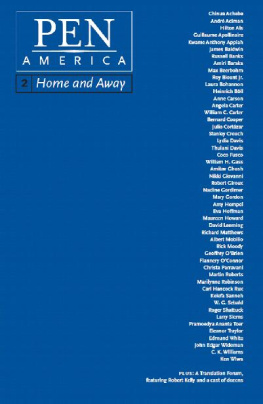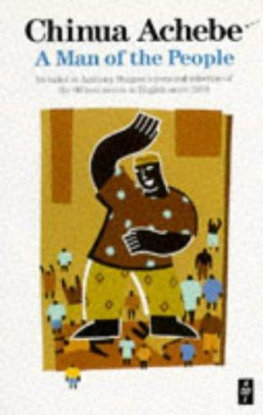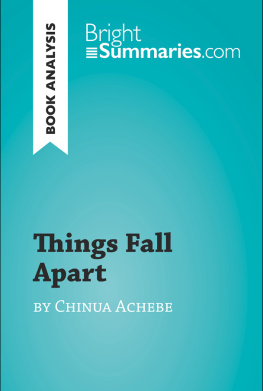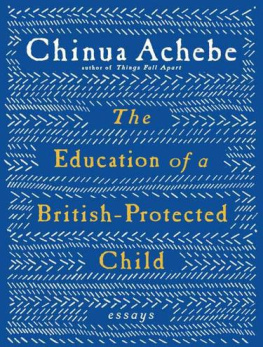Chinua Achebe - Things Fall Apart
Here you can read online Chinua Achebe - Things Fall Apart full text of the book (entire story) in english for free. Download pdf and epub, get meaning, cover and reviews about this ebook. year: 1994, publisher: Anchor Books, genre: Detective and thriller. Description of the work, (preface) as well as reviews are available. Best literature library LitArk.com created for fans of good reading and offers a wide selection of genres:
Romance novel
Science fiction
Adventure
Detective
Science
History
Home and family
Prose
Art
Politics
Computer
Non-fiction
Religion
Business
Children
Humor
Choose a favorite category and find really read worthwhile books. Enjoy immersion in the world of imagination, feel the emotions of the characters or learn something new for yourself, make an fascinating discovery.

- Book:Things Fall Apart
- Author:
- Publisher:Anchor Books
- Genre:
- Year:1994
- Rating:4 / 5
- Favourites:Add to favourites
- Your mark:
- 80
- 1
- 2
- 3
- 4
- 5
Things Fall Apart: summary, description and annotation
We offer to read an annotation, description, summary or preface (depends on what the author of the book "Things Fall Apart" wrote himself). If you haven't found the necessary information about the book — write in the comments, we will try to find it.
Things Fall Apart — read online for free the complete book (whole text) full work
Below is the text of the book, divided by pages. System saving the place of the last page read, allows you to conveniently read the book "Things Fall Apart" online for free, without having to search again every time where you left off. Put a bookmark, and you can go to the page where you finished reading at any time.
Font size:
Interval:
Bookmark:
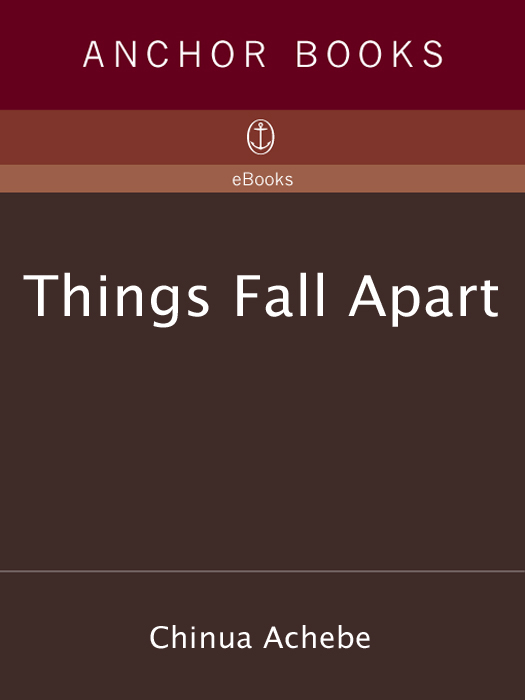
Anthills of the Savannah
The Sacrificial Egg and Other Stories
Things Fall Apart
No Longer at Ease
Chike and the River
A Man of the People
Arrow of God
Girls at War and Other Stories
Beware Soul Brother
Morning Yet on Creation Day
The Trouble with Nigeria
The Flute
The Drum
Home and Exile
Hopes and Impediments
How the Leopard Got His Claws (with John Iroaganachi)
Winds of Change: Modern Short Stories from Black Africa (coeditor)
African Short Stories (editor, with C. L. Innes)
Another Africa (with Robert Lyons)
1. The Ibo religious structure consists of chithe personal godand many other gods and goddesses. What advantages and disadvantages does such a religion provide when compared with your own?
2. The text includes many original African terms and there is a glossary provided. Do you find that this lends atmospheric authenticity, thus bringing you closer to the work? Do you find it helpful?
3. There is an issue here of fate versus personal control over destiny. For example, Okonkwos father is sometimes held responsible for his own actions, while at other times he is referred to as ill-fated and a victim of evil-fortune. Which do you think Okonkwo believes is true? What do you think Achebe believes is true? What do you believe?
4. The threads of the story are related in a circular fashion, as opposed to a conventional linear time pattern. What effect does this impose on the tale of Ikemefuma? What effect does it have on the story of Ezinma?
5. The villagers believeor pretend to believethat the Supreme Court of the nine egwugwu are ancestral spirits. In fact, they are men of the village in disguise. What does this say about the nature of justice in general, and in this village in particular?
6. Our own news media pre-programs us to view the kind of culture clash represented here as being purely racial in basis. Does Achebes work impress as being primarily concerned with black versus white tensions? If not, what else is going on here?
7. Certain aspects of the clans religious practice, such as the mutilation of a dead child to prevent its spirit from returning, might impress us as being barbaric. Casting an honest eye on our own religious practices, which ones might appear barbaric or bizarre to an outsider?
8. In an essay entitled The Novelist as Teacher, Achebe states: Here then is an adequate revolution for me to espouseto help my society regain belief in itself and put away the complexes of the years of denigration and self-abasement (Hopes and Impediments, p. 44). In what ways do you feel that this novel places Achebe closer to the fulfillment of this noble aspiration?
9. Nature plays an integral role in the mythic and real life of the Ibo villagers, much more so than in our own society. Discuss ways in which their perception of animalssuch as the cat, the locust, the pythondiffer from your own, and how these different beliefs shape our behavior.
10. The sacrifice of Ikemefuma could be seen as being a parallel to the crucifixion of Jesus. The event also raises a series of questions. Ikemefuma and the villagers that are left behind are told that he is going home (). Does this euphemism for dying contain truth for them? Do they believe they are doing him a favor? Why do they wait three years, him and Okonkwos family to think of him as a member of the family? Finally, Okonkwo, the father, allows the sacrifice to occur as God presumably allowed Christs sacrifice, with no resistance. How can one accept this behavior and maintain love for the father or God?
11. Of Ezinma, Okonkwo thinks: She should have been a boy (). Why is it necessary to the story that Okonkwos most favored child be a girl?
12. Of one of the goddesses, it is said: It was not the same Chielo who sat with her in the market... Chielo was not a woman that night (). What do you make of this culture where people can be both themselves and also assume other personas? Can you think of any parallels in your own world?
13. There are many proverbs related during the course of the narrative. Recalling specific ones, what function do you perceive these proverbs as fulfilling in the life of the Ibo? What do you surmise Achebes purpose to be in the inclusion of them here?
14. While the traditional figure of Okonkwo can in no doubt be seen as the central figure in the tale, Achebe chooses to relate his story in the third person rather than the first person narrative style. What benefits does he reap by adopting this approach?
15. Okonkwo rejects his fathers way and is, in turn, rejected by Nwoye. Do you feel this pattern evolves inevitably through the nature of the father/son relationship? Or is there something more being here than mere generational conflict?
16. The lives of Ikemefuma and Okonkwo can be deemed parallel to the extent that they both have fathers whose behavior is judged unacceptable. What do you think the contributing factors are to the divergent paths their fate takes them on as a result of their respective fathers shadows?
17. The title of the novel is derived from the William Butler Yeats poem entitled The Second Coming, concerned with the second coming of Christ. The completed line reads: Things fall apart; the centre cannot hold. What layers of meaning are discernible when this completed line is applied to the story?
18. The District Commissioner is going to title his work The Pacification of the Primitive Tribes of the Niger (). What do you interpret from this to be his perception of Okonkwo and the people of Umuofia? And what do you imagine this augurs in the ensuing volumes in Achebes trilogy of Nigerian life?
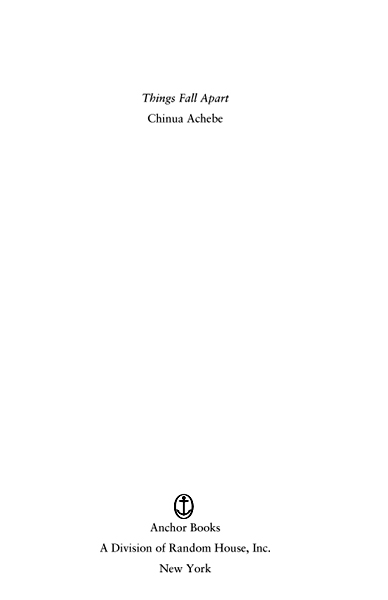
Turning and turning in the widening gyre
The falcon cannot hear the falconer;
Things fall apart; the center cannot hold;
Mere anarchy is loosed upon the world.
W. B. Yeats, The Second Coming
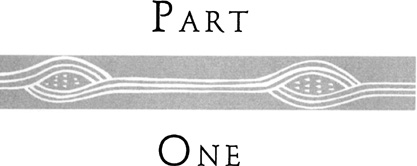
 Okonkwo was well known throughout the nine villages and even beyond. His fame rested on solid personal achievements. As a young man of eighteen he had brought honor to his village by throwing Amalinze the Cat. Amalinze was the great wrestler who for seven years was unbeaten, from Umuofia to Mbaino. He was called the Cat because his back would never touch the earth. It was this man that Okonkwo threw in a fight which the old men agreed was one of the fiercest since the founder of their town engaged a spirit of the wild for seven days and seven nights.
Okonkwo was well known throughout the nine villages and even beyond. His fame rested on solid personal achievements. As a young man of eighteen he had brought honor to his village by throwing Amalinze the Cat. Amalinze was the great wrestler who for seven years was unbeaten, from Umuofia to Mbaino. He was called the Cat because his back would never touch the earth. It was this man that Okonkwo threw in a fight which the old men agreed was one of the fiercest since the founder of their town engaged a spirit of the wild for seven days and seven nights.
The drums beat and the flutes sang and the spectators held their breath. Amalinze was a wily craftsman, but Okonkwo was as slippery as a fish in water. Every nerve and every muscle stood out on their arms, on their backs and their thighs, and one almost heard them stretching to breaking point. In the end Okonkwo threw the Cat.
That was many years ago, twenty years or more, and during this time Okonkwos fame had grown like a bush-fire in the harmattan. He was tall and huge, and his bushy eyebrows and wide nose gave him a very severe look. He breathed heavily, and it was said that, when he slept, his wives and children in their houses could hear him breathe. When he walked, his heels hardly touched the ground and he seemed to walk on springs, as if he was going to pounce on somebody. And he did pounce on people quite often. He had a slight stammer and whenever he was angry and could not get his words out quickly enough, he would use his fists. He had no patience with unsuccessful men. He had had no patience with his father.
Font size:
Interval:
Bookmark:
Similar books «Things Fall Apart»
Look at similar books to Things Fall Apart. We have selected literature similar in name and meaning in the hope of providing readers with more options to find new, interesting, not yet read works.
Discussion, reviews of the book Things Fall Apart and just readers' own opinions. Leave your comments, write what you think about the work, its meaning or the main characters. Specify what exactly you liked and what you didn't like, and why you think so.

